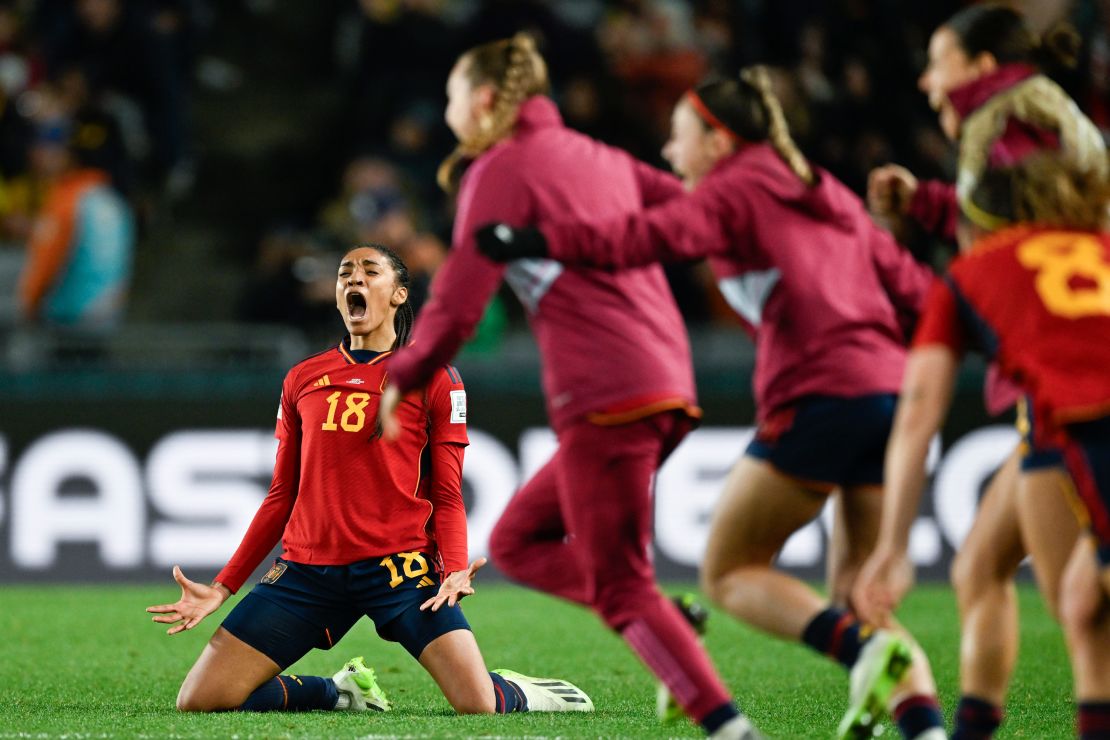Spain has thrilled its fans and neutrals alike with some scintillating performances en route to a historic Women’s World Cup final against England on Sunday.
However, the players’ harmonious play and historic feats on the pitch during this tournament is in contrast to the turmoil between some of the country’s best players, the team’s coach and technical staff, and Spain’s governing body over the last year.
For months, a large number of the squad’s leading players have been at loggerheads with head coach Jorge Vilda and Spain’s soccer federation (RFEF), a dispute that led to some of La Roja’s star names missing this World Cup.
Following the team’s historic wins over the Netherlands and Sweden in the quarterfinals and semifinals respectively, videos went viral on social media of what appeared to be cold reactions from some of Spain’s substituted players towards Vilda and his technical staff, as well as during the post-match celebrations.
One clip shows Barcelona midfielder Alexia Putellas walking towards the bench after being substituted and pulling her hand away from one member of the training staff who tries to give her a low five, before appearing to ignore another’s attempt.
Another clip shows Vilda trying to celebrate with a handful of players following the win over the Netherlands, only to appear to be ignored.
Prior to this tournament, Spain had never won a knockout match at a Women’s World Cup. The chastening 4-0 defeat to Japan in La Roja’s final group stage match was a blow, but the players responded brilliantly and have improved as the tournament has progressed.
The final is certainly a contest between the competition’s two most impressive teams, but it is particularly remarkable that Spain has made it this far given the country’s off-field problems.

Why Spain’s best players are missing
In late September 2022, 15 members of Spain’s senior women’s squad sent personally signed letters to the RFEF via email to announce they would no longer play for the national team, unless there were wholesale changes made throughout the coaching staff.
The identical letters said “the situation” within the Spanish national team, of which the RFEF “are aware,” were affecting the players’ “emotional state” and health.
“As a result, I do not currently consider myself to be in a condition to be chosen for the national team and I ask not to be called up until the situation is resolved,” the letter read.
Three other players – captain Irene Paredes, striker Jennifer Hermoso and Putellas, who was recovering from a knee injury – showed support for their teammates but did not send a letter.
CNN has reached out to the RFEF and Vilda for comment.
After the players’ letter was released, Vilda called the situation a “world embarrassment.”
“The solution I found is to make this list, only with players 100 percent committed to the project,” he added. “If you don’t value what it means to be with the national team, wear this shirt and represent your country, you don’t deserve to be with us.”
Of the 15 players who signed letters, only three are in Spain’s current World Cup squad: Mariona Caldentey, Aitana Bonmati and Ona Batlle.

Among the 12 absentees are some of the best players in the world in their respective positions, including goalkeeper Sandra Pa?os, defender Mapi Leon and midfielder Patricia Guijarro.
In an interview with El Periodico in April, Leon said the players’ continued insistence on not being selected “is not a tantrum.”
“If someone believes that, they understand absolutely nothing of the message that we are trying to send,” she said.
According to a report in The Athletic, among other publications, the players were unhappy with what they thought was poor tactical and physical preparation from the coaching staff, a poor standard of training sessions and some of Vilda’s rules being too controlling or overbearing.
In an interview with Diario de Navarra in September 2022, RFEF vice-president Rafael del Amo called these claims “a lie.” CNN has reached out to the RFEF about the claims.
Other reports say players felt Vilda unworthy of his position, only progressing through the national team’s coaching ranks because of his father, Angel Vilda.
While head coach of the under-17 women’s team, Vilda was also assistant to his father with the under-19s, before taking over his position as head coach when he retired. Vilda was then promoted to lead the senior women’s side in 2015.
Vilda has previously insisted he will not be stepping down and the RFEF has thrown its full support behind him.

The RFEF said in a statement in September that it “is not going to allow the footballers to keep questioning the role of our national manager and his backroom staff. We are not going to submit to any sort of pressure.”
“The RFEF will only call upon players who are committed, even if that means playing with youth players,” the governing body said.
‘Many things are unfair’
Both parties went back and forth with statements and press conferences until the Women’s World Cup came around and there was still no resolution; Vilda and his coaching staff were still in charge and 12 of the 15 players remained absent.
But Spain, nevertheless, went on to make history at this World Cup.
That the country has reached the final for the first time is thanks largely to the country’s incredible strength in depth.
Spain has talented youngsters throughout its national team ranks, while the continued development of the Spanish league, and in particular the success of Barcelona and Real Madrid, has improved standards. Barcelona’s Champions League-winning women’s team forms the team’s core.

In 2022, Spain won both the Under-17 and Under-20 Women’s World Cup. Teenager Salma Paralluelo, for instance, has progressed to the senior team and scored crucial goals in the knockouts.
Vilda has been asked numerous times during press conference at the World Cup about the ongoing dispute, replying to one reporter ahead of the semifinal against Sweden that they were “asking about the past.”
After the quarterfinal win over the Netherlands, the 42-year-old thanked the RFEF for its support and, following the semifinal victory over Sweden, Vilda said the situation had “made all of us stronger.”
Speaking to Marca in the build up to the final, Vilda said there had been “difficult moments” this year but went on to say: “After the year we’ve had, if everything that happened had to happen to be here in the World Cup final, we consider it as positive.”
When asked what it was like to face a dressing room that questioned the worth of the coach and staff, Vilda told the Spanish newspaper that there was no choice but to “focus” on work.
In another interview this week, with Spanish newspaper AS, he said having his “honor” questioned had been difficult and that his loved ones had “suffered a lot.”
“A lot of things were said from people that weren’t true,” he said. “When public opinion gossips about unreal, unjust and false things. That hurts.
“In the end, I think that time puts everyone in their place. In that moment, when I went out in the press conference and I said that if anyone had something to say, that they say it, no one came out. Everything went silent. That silence shows that there was no guilt in anything at all.”
There will likely be mixed emotions for the players – both those at home and those playing in the tournament – ahead of Sunday’s final.
Midfielder Virginia Torrecilla, who wasn’t one of the 15 but played for Spain at the 2015 and 2019 World Cup, said after Spain’s semifinal win over Sweden that she “understands” the decisions of both sets of players.
“I also think that there are players who would have to experience it first-hand and that many things are unfair, but it is impossible not to feel that way,” she wrote on X, formely known as Twitter.

Torrecilla added she felt “proud of everything” she had experienced with the national team and “proud to see that the sport that I love is advancing.”
Teams continuing to be embroiled in disputes with their federations has been one of the overarching themes of this Women’s World Cup. Much progress has been made in women’s soccer, but much still needs to be done.
Win or lose on Sunday, Spain’s campaign has highlighted the country’s on-the-pitch brilliance. But unrest and uncertainty will continue to cast a shadow over the team’s achievements.
Patrick Sung contributed reporting.

